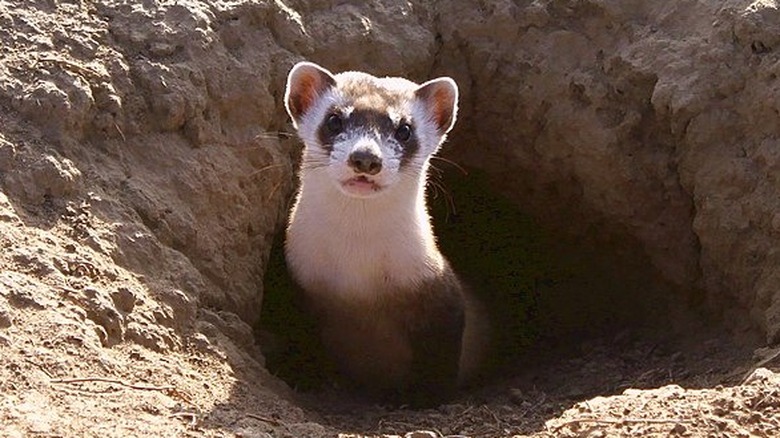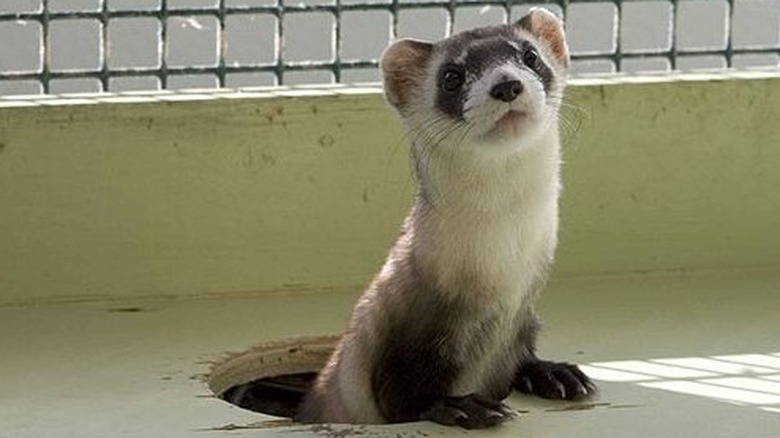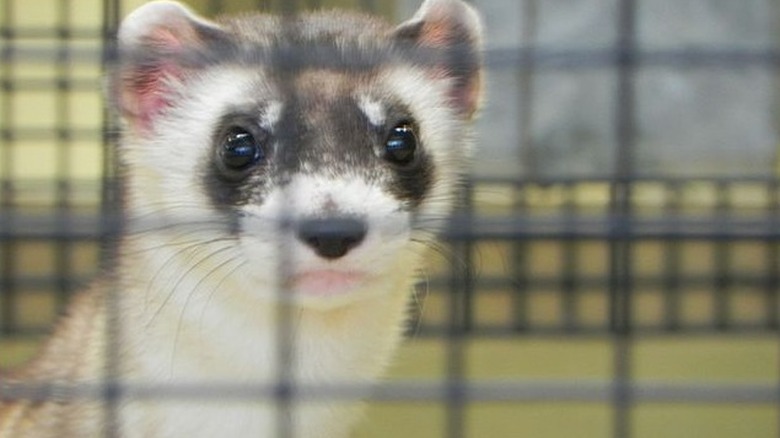How Scientists Are Protecting Endangered Ferrets From The Coronavirus
Before COVID-19 vaccines for humans were even rolled out, another vulnerable population, black-footed ferrets, were already inoculated with their own animal-specific version of the shot, as Denver-based 9News reported in 2020. Given the history of the black-footed ferret species, and what was known about the devastating effects of the virus on the ferret's closely-related mink cousins, there was particular urgency in the minds of scientists to protect the animals from the virus by whatever means necessary. Moreover, in the interest of humans, should the coronavirus which causes COVID-19 transfer back and forth between animal and human population too often, dangerous mutations can occur.
Should such mutations happen, existing vaccines could become less effective, or sometimes, no longer work for both man and animal alike. Some experts believe the virus that causes COVID-19 may have transferred to humans from bats, though the true origins of the virus are unknown and a matter of much debate, per Science. The vaccination of black-footed ferrets took place at the National Black-footed Conservation Center near the town of Fort Collins, Colo. At that time, an early version of a vaccine was used on the animals. Though related in theory, that vaccine was different in several crucial ways from the mRNA vaccines approved for human use, as Live Science notes.
Black-footed ferrets were once thought to be extinct
Causing experts at the Colorado-based conservation center further concern: The more than 100 creatures set to receive their shots were not supposed to be alive at all, as Smithsonian Magazine notes. The black-footed ferret was declared extinct in 1979, but a small population was discovered two years later in Wyoming. At that time, a number of black-footed ferrets were rescued and transferred to a captive breeding program while those left behind died out from disease. As Smithsonian magazine explained, black-footed ferrets in the program numbered in the hundreds, and diseases such as COVID-19 caused by previously unknown viruses, are especially deadly for the creatures.
On that note, when those vaccine shots were administered to the ferrets, none of the creatures were known to have been infected, nor was it clear just how deadly COVID-19 might be for the animal. According to CNN, though, the coronavirus already proved deadly for animals closely related to ferrets such as minks, causing thousands of the creatures to die and many more to be culled to help mitigate further infection. Given the precarious position of the remaining black-footed ferret, scientists in Colorado took no chances as the coronavirus spread rapidly throughout the human and animal population.
The ferrets at the conservation center were also all genetically similar
Also complicating the matter, the black-footed ferrets at the Colorado conservation center came from the same breeding pool, making them all genetically similar. That close breeding can also cause a weakened immune system, meaning a potential outbreak of COVID-19 among the ferret population could become that much more deadly, based on a Colorado Public Radio (CPR) report from 2020. Afterwards, a number of ferrets were vaccinated and given booster shots for coronavirus antibodies were found in their blood. This was greeted by scientists as a sign that the vaccine had worked.
Another group of animals was left unvaccinated for control purposes. Also, at that time, National Wildlife Health Center research scientist Tonie Rocke said (via CPR) "We can do these sorts of things experimentally in animals that we can't do in humans." The vaccine used on the ferrets was developed in collaboration between the National Wildlife Health Center, the U.S. Fish and Wildlife Service, and the black-ferret conservation center. It was made from a purified protein of the SARS-CoV-2 virus, or the spike protein, and an adjuvant to trigger an immune system response in the animal.


